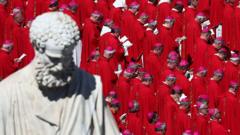Just days before the conclave, where 133 cardinals will convene in the Sistine Chapel to select a successor to Pope Francis, the air is filled with palpable anticipation and secrecy. Each cardinal has committed to a solemn vow of confidentiality that extends to all individuals inside Vatican City during this exceptional election process. This prohibition includes doctors and kitchen staff, all swearing to maintain “absolute and perpetual secrecy” surrounding the event.
Preparation is meticulous, with the Sistine Chapel and surrounding guesthouses examined for any electronic devices. To uphold this isolation, the Vatican employs electronic jammers to block external phone and Wi-Fi signals. John Allen, editor of the Crux news site, emphasized, “The Vatican takes the idea of isolation extremely seriously,” outlining the lengths taken to protect this sacred election.
Total lockdown is not just about secrecy; it's aimed at shielding the voting cardinals from outside influences and interference during what is arguably one of the most significant decisions they will ever make. Each cardinal must surrender all electronic devices upon entering the conclave, with strict enforcement managed by the Vatican police. “The logic is trust but verify,” Allen notes, as the conclave goes so far as to prohibit all communication, allowing only walkie-talkies for emergencies.
Outside the chapel, however, the atmosphere shifts. While the cardinals must remain silent, anticipation pervades, with local journalists and citizens acting as “cardinal-hunters,” keen to spot hints of alliances or preferences. Publications in Italy are buzzing with speculative headlines about the future leader of the church, with reporters often trailing the clergy during their public appearances.
In total, nearly 250 cardinals are present in Rome, with a significant number ineligible to vote due to age restrictions. Yet those eligible are bombarded with questions about the state of discussions—a situation described by Ines San Martin from the Pontifical Mission Societies as a “need for unity” in the face of diverse perspectives.
The process holds implications beyond ecclesiastical matters, as the pope heads a global institution that wields substantial moral and social influence. Though traditionally the decision is viewed as divine, the power dynamics of church politics cannot be dismissed. The media plays a formidable role, with varying factions influencing the discourse. There even exists the historical precedent where certain Catholic monarchs held veto power in elections—a privilege revoked in 1907.
Despite these intense external pressures, many in the Vatican believe that the cardinals will focus on the spiritual aspect of their task rather than the political negotiations outside. Allen predicts that personal convictions will overshadow the noise generated by lobbyists and media.
As of Wednesday morning, the cardinals will be sealed off from the world, stripped of their communication devices. The outcome remains uncertain, yet the discussions among these electors will play a critical role in this vital decision, which holds the potential to reshape not only the Catholic Church but also its role in global society.



















